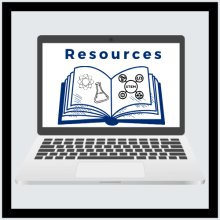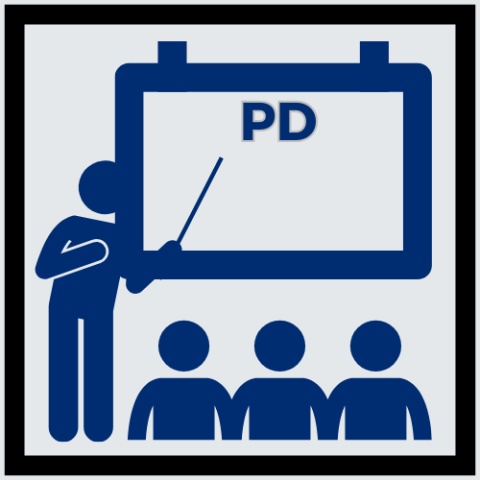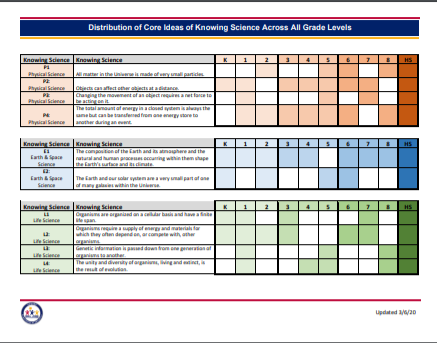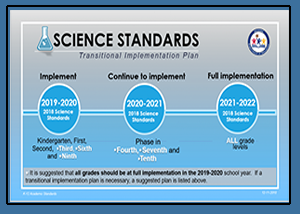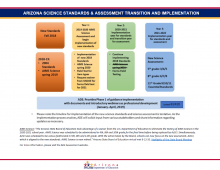Standards: Science Standards
Arizona Science Standards
(Adopted October 2018)
| QUICK links |
|---|
Science & STEM Resources Professional Learning Science Mailing List STEM Mailing List
|
Access PAASport
Look for the word CASE next to each of our Word and PDF files. The Competencies and Academic Standards Exchange is the framework that allows for the navigation and integration of Arizona Academic Standards.
Science and STEM Self-Paced Online Courses
Complete K-12 Standards Document | PDF | CASE
Kindergarten-Second Grade PDF | Word | CASE (Update 12.22.21)
Sixth Grade-Eighth Grade PDF | Word | CASE (Update 12.22.21)
Research Used to Develop the 2018 Arizona Science Standards: Framework for K-12 Science Education | Working with Big Ideas of Science Education
STANDARDS SUPPORT MATERIALS
*New* State of Science - This District Planning Tool is a resource that supports districts, schools, and educators in setting goals and prioritizing needs by identifying strengths and growth opportunities.
ADE Guidance for Evaluating High-Quality Instructional Science Materials Resource Page | Video - Looking for guidance when evaluating high-quality science instructional materials? Use this helpful tool, which is full of resources to help educators and district leaders understand how the Arizona Science Standards compare to the Next Generation Science Standards, as well as tools for evaluating instructional materials. For a quick review of this tool, watch the short video that accompanies it! Also, here is a useful resource that provides additional guidance: STEM Teaching Tool #23:Evaluating Curriculum Materials for Alignment with the New Vision for K-12 Science Education.
Complete Set of K-12 Planning Summaries that Compare the AzSS to NGSS - This document can help you understand how our Arizona Science Standards (AzSS) are correlated to the Next Generation Science Standards (NGSS).
Planning Summaries by Grade Level:
Designing Phenomena-Based Instruction - A simple flowchart designed to explain how to begin designing phenomena-based instruction.
AzSS 3-Dimensional Snapshot for Educators & Administrators - A fantastic tool to help educators & administrators take a quick look at our 3-dimensional science standards.
Updated: 3-Dimensional Snapshot for Educators & Administrators (5/2025)
.
Updated: 3-Dimensional Snapshot for Educators & Administrators (5/2025)
- Archived: AzSS 3-Dimensional Snapshot (3/2020)
Guidance for Administrators- What to Look For in a 3-Dimensional Science Classroom PD Video | PDF | Resource Page - A webinar for Administrators to help support educators with the transition to the 2018 Science Standards.
*New* State of Science - This District Planning Tool is a resource that supports districts, schools, and educators in setting goals and prioritizing needs by identifying strengths and growth opportunities.
Instructional Shifts: A New Vision for Science Education- This document demonstrates what science education will be involved less of, and more of when shifting to 3-dimensional standards.
Look Fors for Administrators - A great tool for administrators and educators that indicates the three "look for" in a 3-Dimensional Science Classroom.
STEM Teaching Tool 4- Are there multiple instructional models that fit with the science and engineering practices in NGSS? (Short answer: Yes.)
STEM Teaching Tool 21- What school building administrators should know about the new vision for K-12 science education.
STEM Teaching Tool 46- How to define meaningful daily learning objectives for science investigations.
STEM Teaching Tool 32 - Why focus on science and engineering practices--and not "inquiry?" Why is "the scientific method" mistaken?
Arizona Science Standards
*NEW* Complete Set of K-12 Progression Matrix of Elements for the 3-Dimensions of the Arizona Science Standards- Core Ideas, Science & Engineering Practices, & Crosscutting Concepts- This document combines all three matrices of elements for the 3-dimensions. An essential tool for planning 3-D instruction. View this short video for information about how to read and use this document.
Vertical Progression of Core Ideas- This document showcases the vertical progressions from K-12 for each Core Idea of Knowing Science. An essential tool for planning 3-D instruction.
K-12 Crosscutting Concepts Progression Matrix of Elements- This document describes the "elements," or specific pieces of knowledge and skill that make up the practice at each grade band, for the Crosscutting Concepts. An essential tool for planning 3-D instruction.
K-12 Science and Engineering Practices Progression Matrix of Elements- This document describes the "elements," or specific pieces of knowledge and skill that make up the practice at each grade band, for the Science & Engineering Practices. An essential tool for planning 3-D instruction.
Distribution of Core Ideas of Knowing Science Across Grade Levels (pdf) - This document illustrates how the Core Ideas of Knowing Science spiral throughout K-12.
Graduation Requirements Timeline Science Standards.pdf
Transitional Implementation Plan
Revision and Tentative Implementation
- Disciplinary Literacy in Grades K-2
- Disciplinary Literacy in Grades 3-5
- Disciplinary Literacy in Grades 6-8
- Disciplinary Literacy in Grades 9-12
PROFESSIONAL LEARNING OPPORTUNITIES
Tucson Regional Educator Collaborative (TREC) - Explore PD opportunities across Arizona for all subjects.
Webinars
Each recorded webinar has a link to the video of the live webinar session, a PDF of the presentation slides, and the resource page used during the webinar.
Pathway #1
New to 3-Dimensional Instruction? START HERE! Introduction to the AzSS & 3-Dimensional Instruction
A Look at Arizona's New Science Standards Video | PDF | Resource Page | *NEW* Online Course for PD Credit
Crosscutting Concepts: 1 of the 3 Dimensions of the AZ Science Standards Video | PDF | Resource Page | *NEW* Online Course for PD Credit
Science and Engineering Practices: 1 of the 3 Dimensions of the AZ Science Standards Video | PDF | Resource Page | *NEW* Online Course for PD Credit
Core Ideas: 1 of the 3 Dimensions of the AZ Science Standards Video | PDF | Resource Page | *NEW*Online Course for PD Credit
Phenomenon-Based 3-Dimensional Instruction Video | PDF | Resource Page
SEPs, CCCs, and Core Ideas: Putting the 3-Dimensions Together Video | PDF | Resource Page
*NEW* Guidance for Administrators- What to Look For in a 3-Dimensional Science Classroom PD Video | PDF | Resource Page
Pathway #2
Confident in your understanding of webinar content in Pathway 1? Go here next! Instructional Practices to Support 3-Dimensional Teaching & Learning
Transforming Science Learning: Engaging Students in the Science & Engineering Practices Using Digital Tools Video | PDF | Resource Page
5-E Instructional Model and Science Notebooks Video | PDF | Resource Page
Constructing Explanations and Arguing from Evidence using Claims, Evidence, Reasoning (CER) Video | PDF | Resource Page
SEP Asking Questions: Students Drive Instruction with Driving Question Boards! Video| PDF | Resource Page
Engaging Students in Developing & Using Models Using Digital Tools (w/a GRC Lesson) Video | PDF | Resource Page
Engaging Students in 3-Dimensional Science Investigations using a Gather, Reason, Communicate (GRC) Lesson-Middle School Video | PDF | Resource Page
*NEW* CER or ERC? Constructing Explanations & Arguing from Evidence for 6-12 Science Educators Video | PDF | Resource Page
*NEW* Effective Discourse Strategies for Creating Inclusive STEM Classrooms | PDF | Resource Page
Pathway #3
Confident in your understanding of webinar content in pathways 1 & 2? Go here next! Summative & Formative Assessment and Performance Tasks
What Secondary Science Educators Need to Know About Performance Tasks Video | PDF | Resource Page | *NEW* Online Course for PD Credit
What Elementary Science Educators Need to Know About Performance Tasks Video | PDF | Resource Page | *NEW*Online Course for PD Credit
Science Standards Videos
Science Standards Overview Video (11:02)- General overview of the standards.
Shift in Science Education Video (8:35)- The focus of this video is on the shifts in instruction.
Arizona Science Standards (AzSS) vs. Next Generation Science Standards (NGSS) Part I- (14:29) Need a little support with understanding how our Arizona Science Standards (AzSS) are the same or different from the Next Generation Science Standards (NGSS)? Watch this two-part short video series. Part I compares the basics of each set of standards.
Arizona Science Standards (AzSS) vs. Next Generation Science Standards (NGSS) Part 2- (12:57) Need a little support with understanding how our Arizona Science Standards (AzSS) are the same or different from the Next Generation Science Standards (NGSS)? Watch this two-part short video series. Part II reviews how to compare an AzSS standard to an NGSS standard with a step-by-step approach.
Click to access AzSCI assessment website
Click to view archived newsletters
**The views and opinions expressed in any third-party resource do not necessarily reflect those of the Arizona Department of Education (ADE) and do not imply an endorsement by ADE.
For an accessibility version of documents, please contact the Academic Standards unit.






